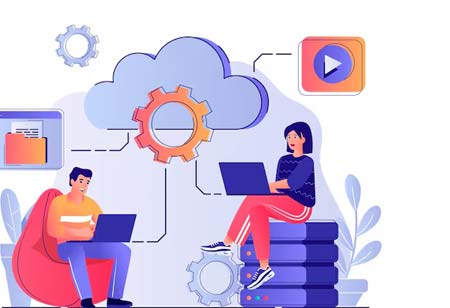THANK YOU FOR SUBSCRIBING
Be first to read the latest tech news, Industry Leader's Insights, and CIO interviews of medium and large enterprises exclusively from Hrtech Outlook
THANK YOU FOR SUBSCRIBING

By
HR Tech Outlook | Friday, October 24, 2025
Stay ahead of the industry with exclusive feature stories on the top companies, expert insights and the latest news delivered straight to your inbox. Subscribe today.
FREMONT, CA: The rise of corporate learning management systems (LMS) in Europe has been an emerging and transformative trend in recent years, revolutionising the way businesses approach employee training and development. As the digital landscape evolves rapidly, organizations across the continent are increasingly turning to innovative technologies to enhance workforce skills, productivity, and overall performance. This paradigm shift has been fueled by a growing recognition of the crucial role that continuous learning plays in fostering a competitive edge in the global market.
The pandemic has further accelerated the adoption of LMSs in Europe. With many employees working remotely, businesses have had to find new ways to deliver training and development programs. LMSs have made it possible to provide employees with access to a wide range of learning resources, regardless of their location.
In addition to the pandemic, other factors that are driving the adoption of LMSs in Europe include:
The increasing demand for upskilling and reskilling: As the job market becomes more competitive, businesses are under pressure to ensure that their employees have the skills they need to stay ahead of the curve. LMSs can help businesses to provide employees with the training they need to acquire new skills and stay ahead of the competition.
The growing popularity of e-learning: E-learning is becoming increasingly popular in Europe, as it offers several advantages over traditional face-to-face training. LMSs can help businesses to deliver e-learning programs that are effective, engaging, and scalable.
The need for compliance: In some industries, businesses are required to provide employees with specific training. LMSs can help businesses track employee training and ensure that they are compliant with all relevant regulations.
Technological Advancements Driving LMS Adoption
One of the primary factors fueling the growth of Corporate LMS in Europe is the rapid advancement of technology. With the proliferation of mobile devices, cloud computing, and seamless internet connectivity, employees can now access training content anytime, anywhere. The integration of virtual reality (VR) and augmented reality (AR) into LMS platforms has also revolutionized training experiences, making learning more immersive and engaging.
Focus on Employee Development and Upskilling
As businesses compete in an increasingly dynamic and competitive market, the need to invest in employee development and upskilling has become paramount. Corporate LMS allows organisations to offer personalised training programs to their workforce, enabling them to acquire new skills and knowledge that align with their roles and career aspirations. This emphasis on continuous learning has resulted in a more agile and skilled workforce, capable of adapting to industry shifts and technological advancements.
Enhanced Data Analytics and Insights
Corporate LMS platforms offer powerful data analytics capabilities, providing organisations with valuable insights into the effectiveness of their training programs. Through data-driven assessments, companies can identify knowledge gaps, monitor employee progress, and measure the impact of training initiatives on business performance. This data-driven approach allows businesses to make informed decisions, optimizing their training strategies and maximizing return on investment.
Collaboration and Social Learning Features
The rise of social learning and collaborative training methods has contributed significantly to the popularity of Corporate LMS. These platforms enable employees to connect, share knowledge, and collaborate on projects, fostering a culture of continuous learning within the organisation. The integration of discussion forums, chat features, and peer-to-peer mentoring has enhanced employee engagement and knowledge retention, promoting a sense of community among learners.
Compliance and Regulatory Requirements
In heavily regulated industries, such as finance, healthcare, and manufacturing, compliance with industry standards and regulations is crucial. Corporate LMS solutions help organisations meet these requirements by delivering tailored compliance training and certification programs. These platforms ensure that employees are up-to-date with the latest regulations, mitigating the risk of non-compliance and potential legal issues.
Integration with Talent Management Systems
The integration of Corporate LMS with talent management systems has streamlined employee development processes. Organisations can now link learning outcomes with performance evaluations, career progression, and succession planning. This alignment facilitates the identification of high-potential employees and enables targeted development plans to nurture leadership skills within the workforce.
Corporate Learning Management System (LMS) platforms are witnessing a surging wave of popularity across Europe, primarily attributable to their unwavering focus on enhancing employee development, upskilling initiatives, and fostering a culture of continuous learning. These cutting-edge platforms present a diverse array of learning opportunities, enabling companies to effectively monitor and evaluate their employees' progress while fostering seamless collaboration among team members. Furthermore, by ensuring strict compliance adherence, LMS platforms act as an essential tool in meeting regulatory requirements.
By offering unrestricted access to a plethora of courses, meticulously tracking individual progress, encouraging the sharing of knowledge, and ensuring compliance with industry standards, LMS platforms serve as the driving force behind the competitiveness and innovation of European businesses. The significance of these platforms is bound to amplify in the ever-evolving landscape of the corporate world, as they play an instrumental role in cultivating and maintaining a highly skilled workforce, thereby fortifying businesses to thrive in an ever-changing marketplace.
I agree We use cookies on this website to enhance your user experience. By clicking any link on this page you are giving your consent for us to set cookies. More info

However, if you would like to share the information in this article, you may use the link below:
www.hrtechoutlookeurope.com/news/the-rise-of-corporate-lms-in-europe--nid-3452.html



